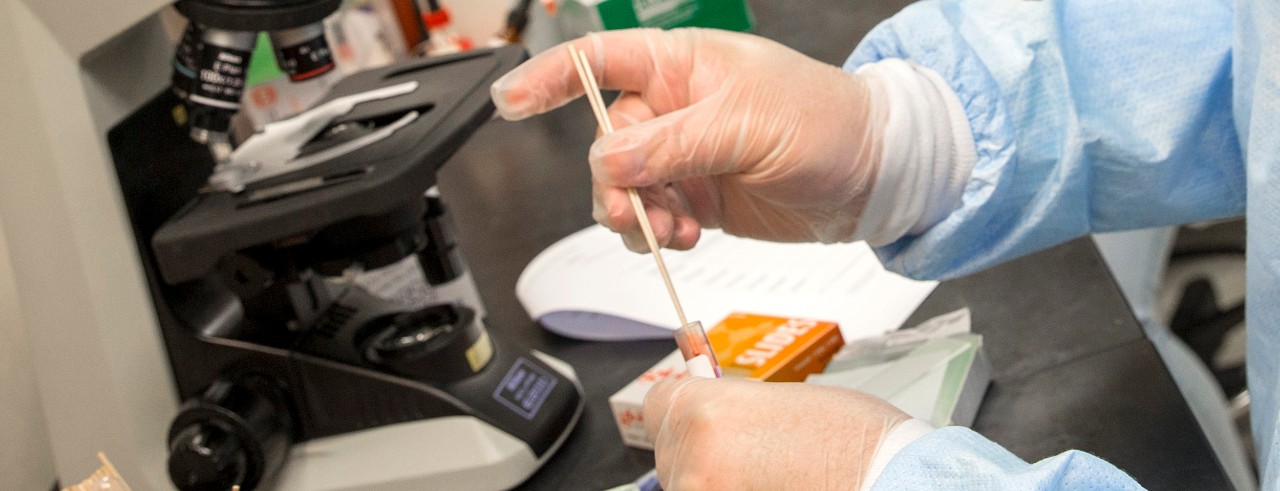
Thyroid screening may not be needed in all youth with psychiatric disorders, UC study says
Student-led research looks at value of universal screening for thyroid abnormalities in kids with severe anxiety and depression symptoms
A new study from researchers at the University of Cincinnati (UC) and Cincinnati Children’s looks at the prevalence of abnormal thyroid function in youth with severe mood and anxiety disorder. It is the largest study to date of this population and will help mental health professionals better understand the predictors of abnormal thyroid function, like weight gain, family history or treatment with certain medications.
“I was interested in devising this study because I wanted to better understand any relationship between the physical illness and mood disorder,” says Marissa Luft, a third-year medical student at UC, and lead author on the study.
“The American Academy of Child and Adolescent Psychiatry recommends that clinicians consider of hypothyroidism or hyperthyroidism when assessing anxious or depressed youth, given that some thyroid conditions produce anxiety or depressive symptoms. However, until this study, we had limited evidence as to whether routine screening with a laboratory test was the best approach to screen for thyroid disease in kids with anxiety and depression,” says corresponding author Jeffrey Strawn, MD, associate professor in the Department of Psychiatry and Behavioral Neuroscience at the UC College of Medicine and director of UC’s Anxiety Disorders Research Program, who mentored Luft. "These results suggest that screening, with a blood test, may be most helpful when the other predictors of thyroid disease are present,” added Strawn.

Jeffrey Strawn, MD
The results are available online in the Journal of Clinical Psychiatry.
The thyroid gland is closely connected to brain function and, with other systems, regulates many systems in the body as well as metabolism. It produces hormones that regulate the rate at which food is converted into energy. An overactive thyroid, or hyperthyroidism, can produce anxiety, weight loss and decreased appetite, and poor concentration. Hypothyroidism (too little hormone production) can cause fatigue, weight gain and increase in appetite, slower motor skills and concentration and may look like depression.
“The study is based on chart review data of pediatric patients that were hospitalized for psychiatric disorders at Cincinnati Children’s and had routine thyroid screening tests performed. We looked at the prevalence of thyroid disease in patients hospitalized with psychiatric complaints as well as other factors that may have predicted abnormal thyroid hormone levels,” says Luft.
An analysis of 1,319 patients under the age of 19, found that the thyroid-stimulating hormone concentrations were abnormal in just over 6% of the psychiatrically hospitalized youth at Cincinnati Children’s.
“This is the largest study to examine the utility of thyroid function screening in psychiatrically hospitalized youth with severe mood and anxiety disorders, and though it relies on existing medical history data, it does help us better understand the predictors of abnormal thyroid function tests,” says collaborator, Laura Ramsey, PhD, assistant professor of pediatrics and clinical pharmacology.
Luft notes that from this study and other literature, they determined predictors of elevated thyroid-stimulating hormone levels.
“When considering thyroid assessment in youth with anxiety and mood disorders, targeted screening should focus on patients with a family history of thyroid disease, recent weight gain, treatment with specific medications, and in girls, any history of abnormal uterine bleeding,” notes Luft.
“The prevalence of thyroid disorders is poorly understood in pediatric populations, particularly in the area of psychiatric disorders,” notes Luft, and believes the data can help inform more targeted approaches to screening, and will be of clinical interest to pediatricians, child and adolescent psychiatrists, and other mental health providers.
As an undergraduate, Luft worked with Strawn during the summers of 2016 and 2017 through the UC ROSE program, a unique research internship program which offers high-achieving students early admission to the College of Medicine, while actively engaging them in “Research, Observation, Service, and Education” (ROSE) experiences over two summers. Luft also received the Summer Medical Student Fellowship supported by American Academy of Child and Adolescent Psychiatry’s Campaign for America’s Kids in 2018, which funded the research.
Additional funding for Strawn was provided by the National Institute of Mental Health (K23MH106037). Strawn has received research support from Edgemont, Shire, Allergan, Lundbeck, Neuronetics and has consulted for Myriad Genetics.
Featured photo at top of a sample blood test/ Colleen Kelley/ UC Creative Services
Next Lives Here
The University of Cincinnati is classified as a Research 1 institution by the Carnegie Commission and is ranked in the National Science Foundation's Top-35 public research universities. UC's graduate students and faculty investigate problems and innovate solutions with real-world impact. Next Lives Here.
Related Stories
Machine learning brings new insights to cell’s role in...
April 30, 2025
Researchers led by the University of Cincinnati’s Anna Kruyer and the University of Houston’s Demetrio Labate have published research in the journal Science Advances applying object recognition technology to track changes in brain cell structure and provide new insights into how the brain responds to heroin use, withdrawal and relapse.
Most teens prescribed SSRIs did not have recommended follow-up...
April 30, 2025
The University of Cincinnati and Cincinnati Children's Hospital Medical Center's Martine Lamy commented to Medscape on new research that found fewer than half of the adolescents prescribed a selective serotonin reuptake inhibitor (SSRI) at two large Chicago pediatric primary care clinics had a follow-up visit within the recommended 6 weeks.
Students shine at 2025 CAHS Scholarly Showcase
April 29, 2025
Nearly 200 students and more than 40 alumni judges participated in the 2025 CAHS Scholarly Showcase at the University of Cincinnati, featuring 82 research projects across allied health disciplines.
